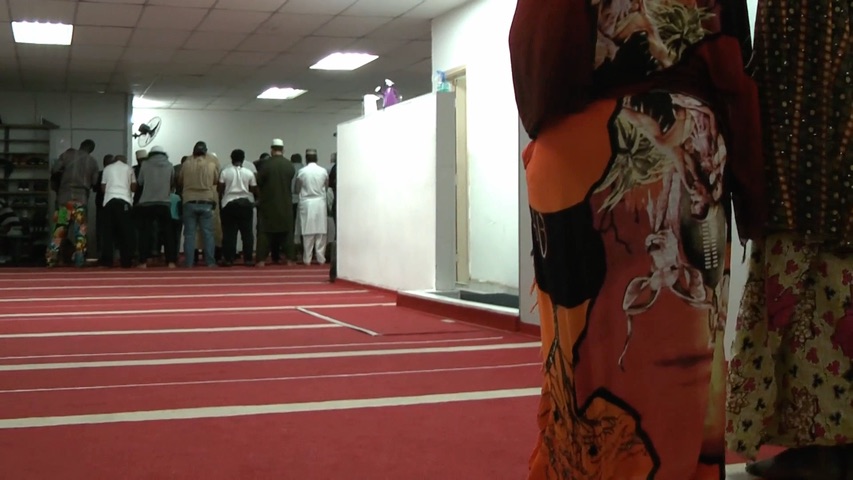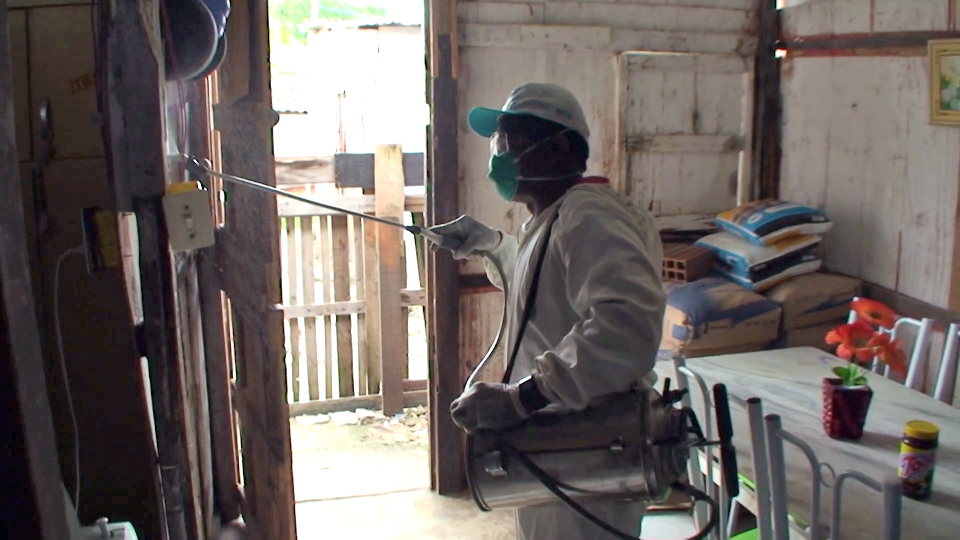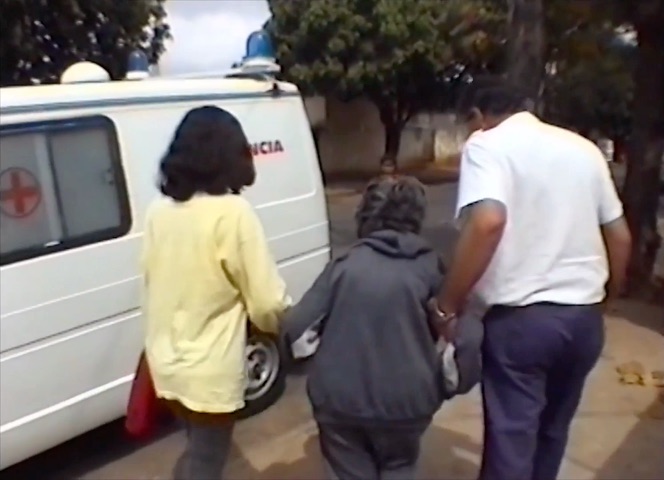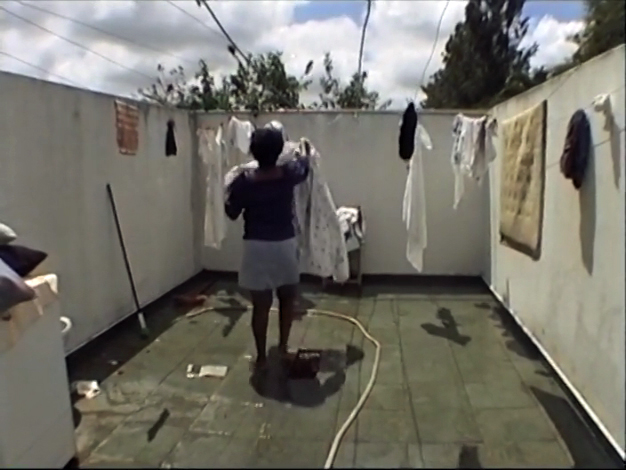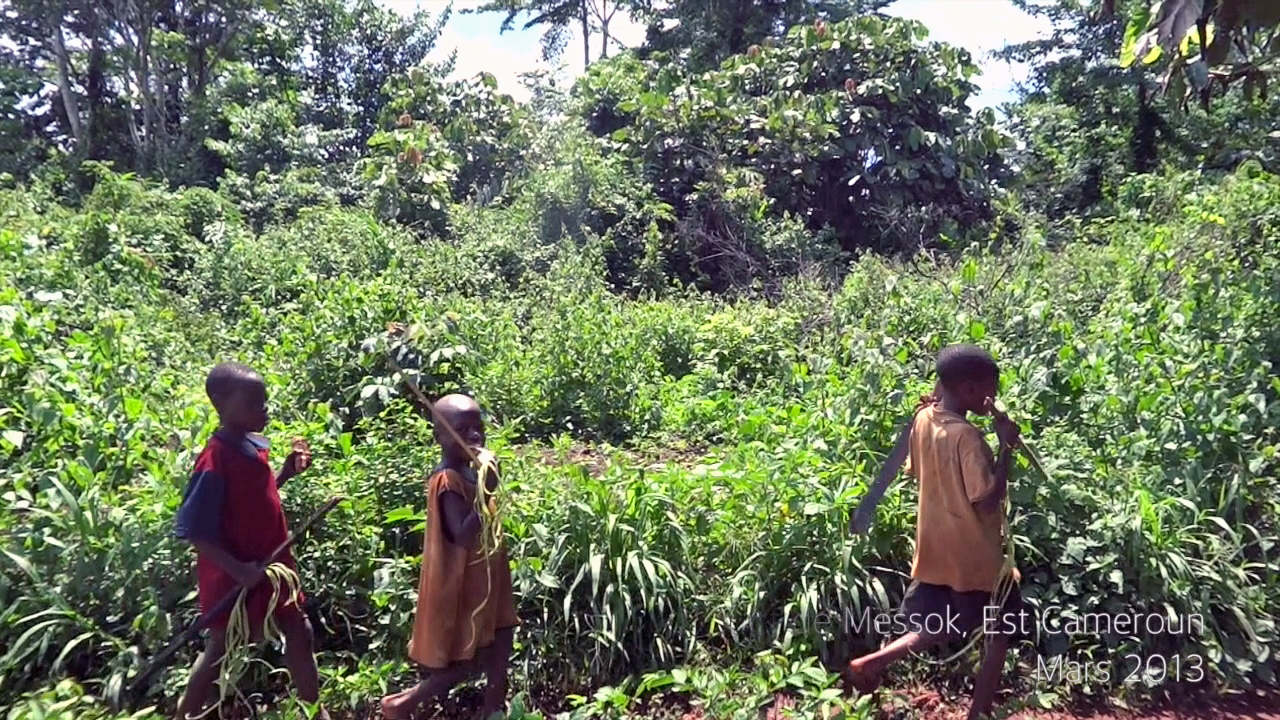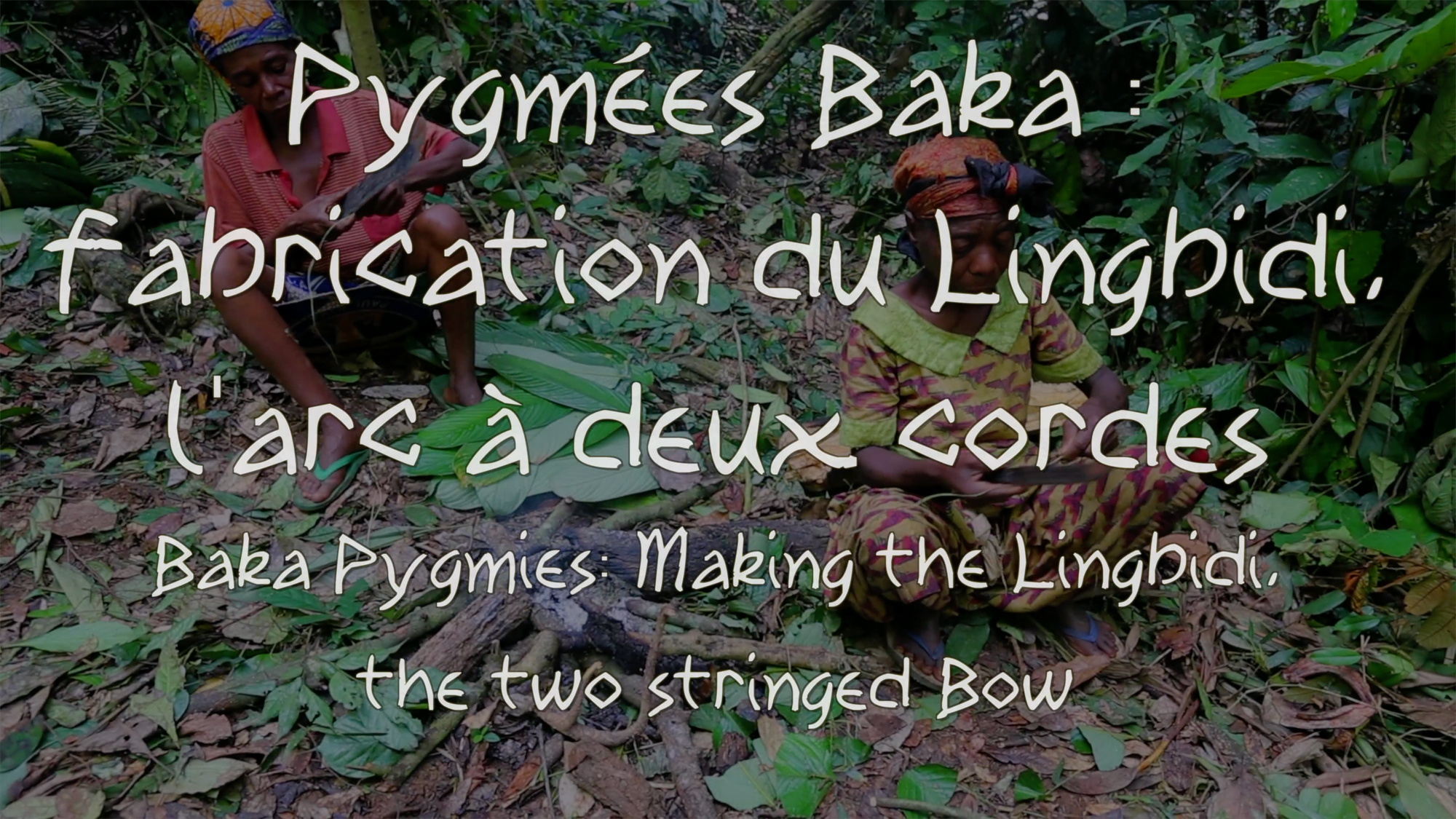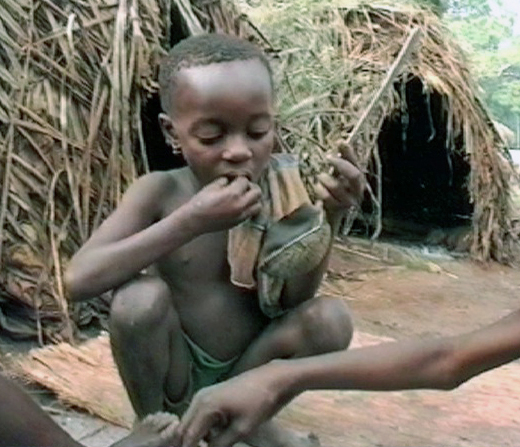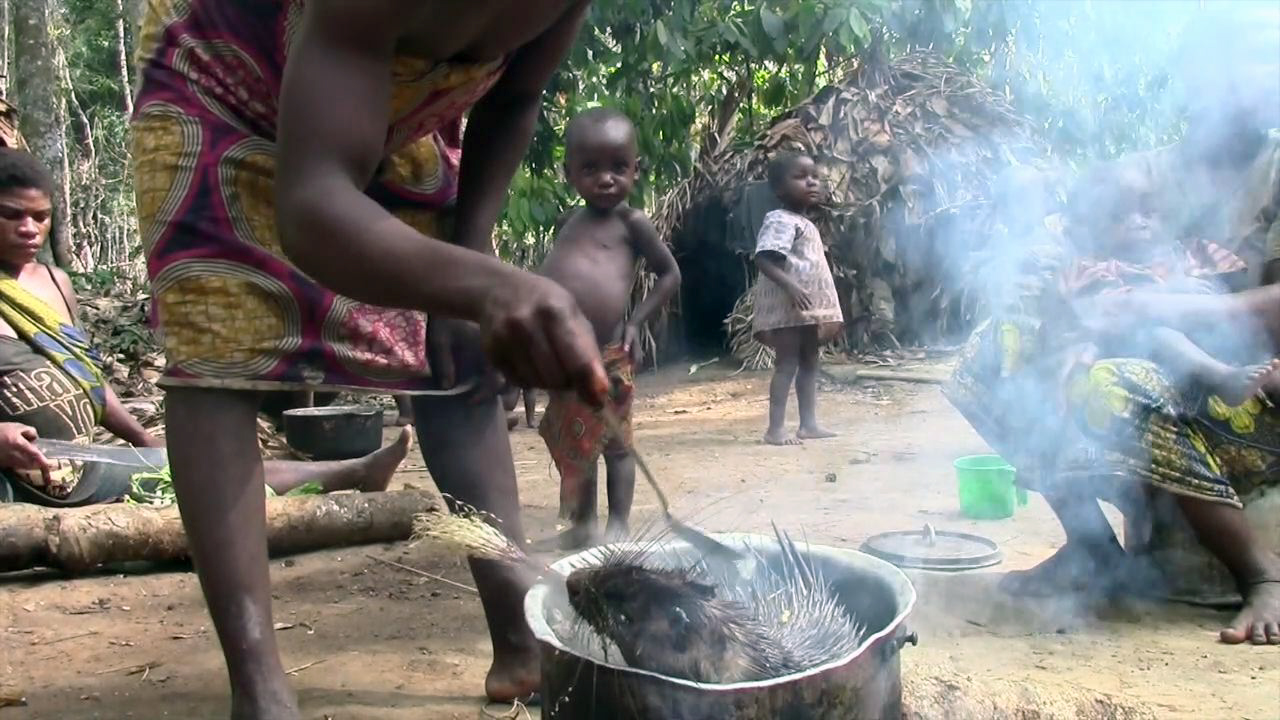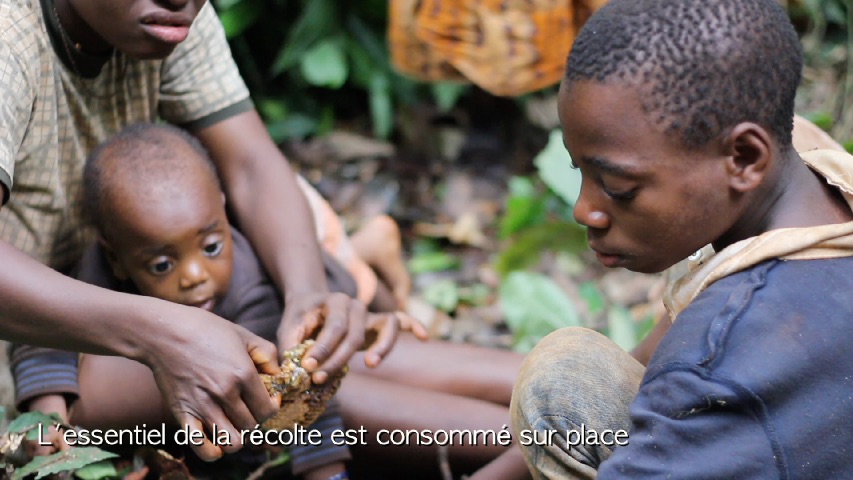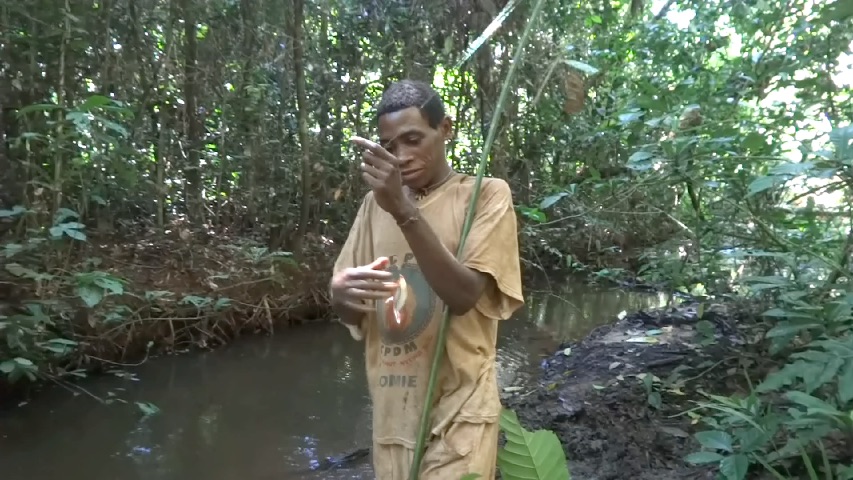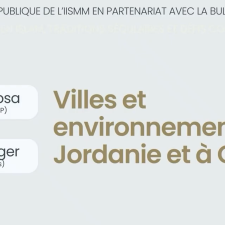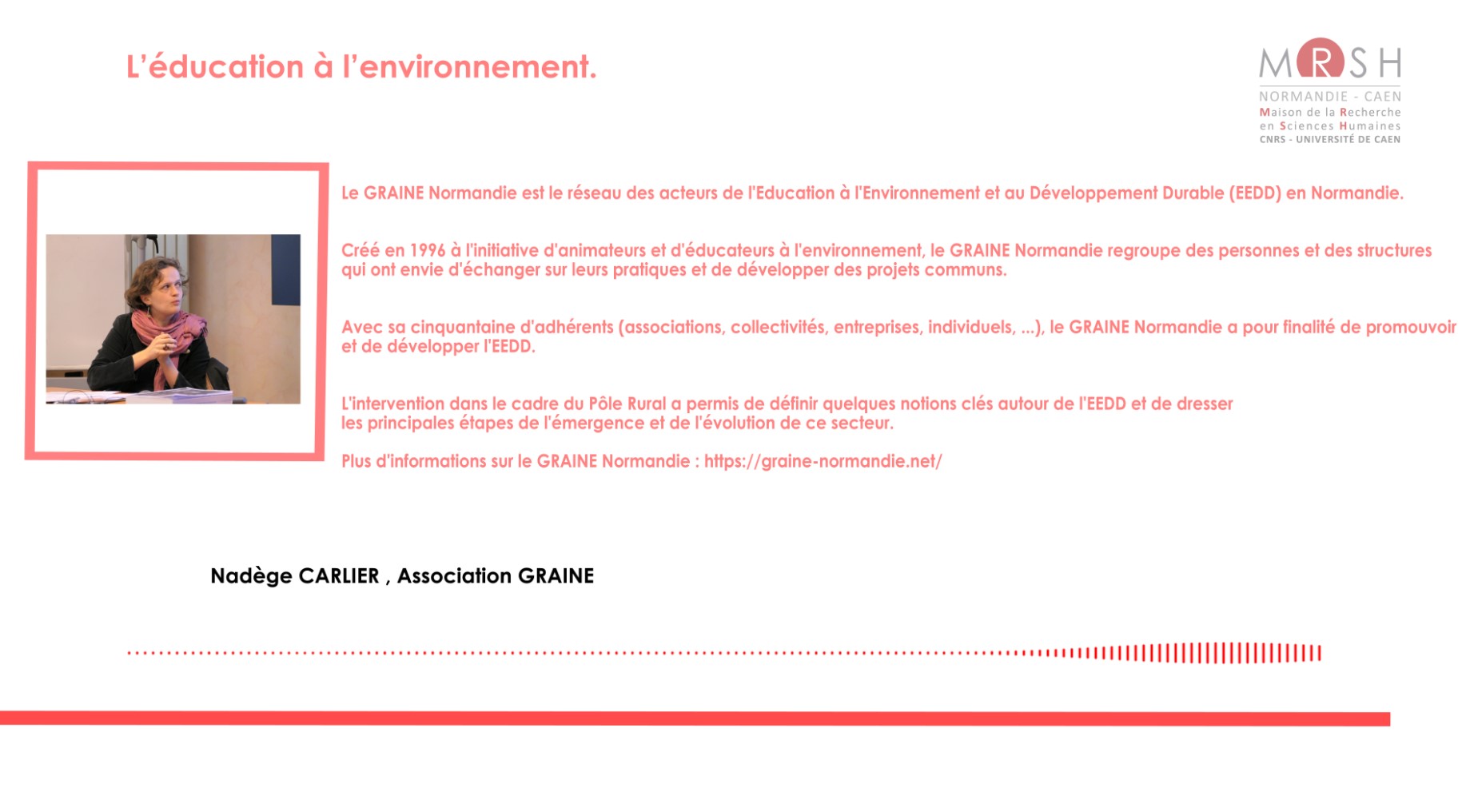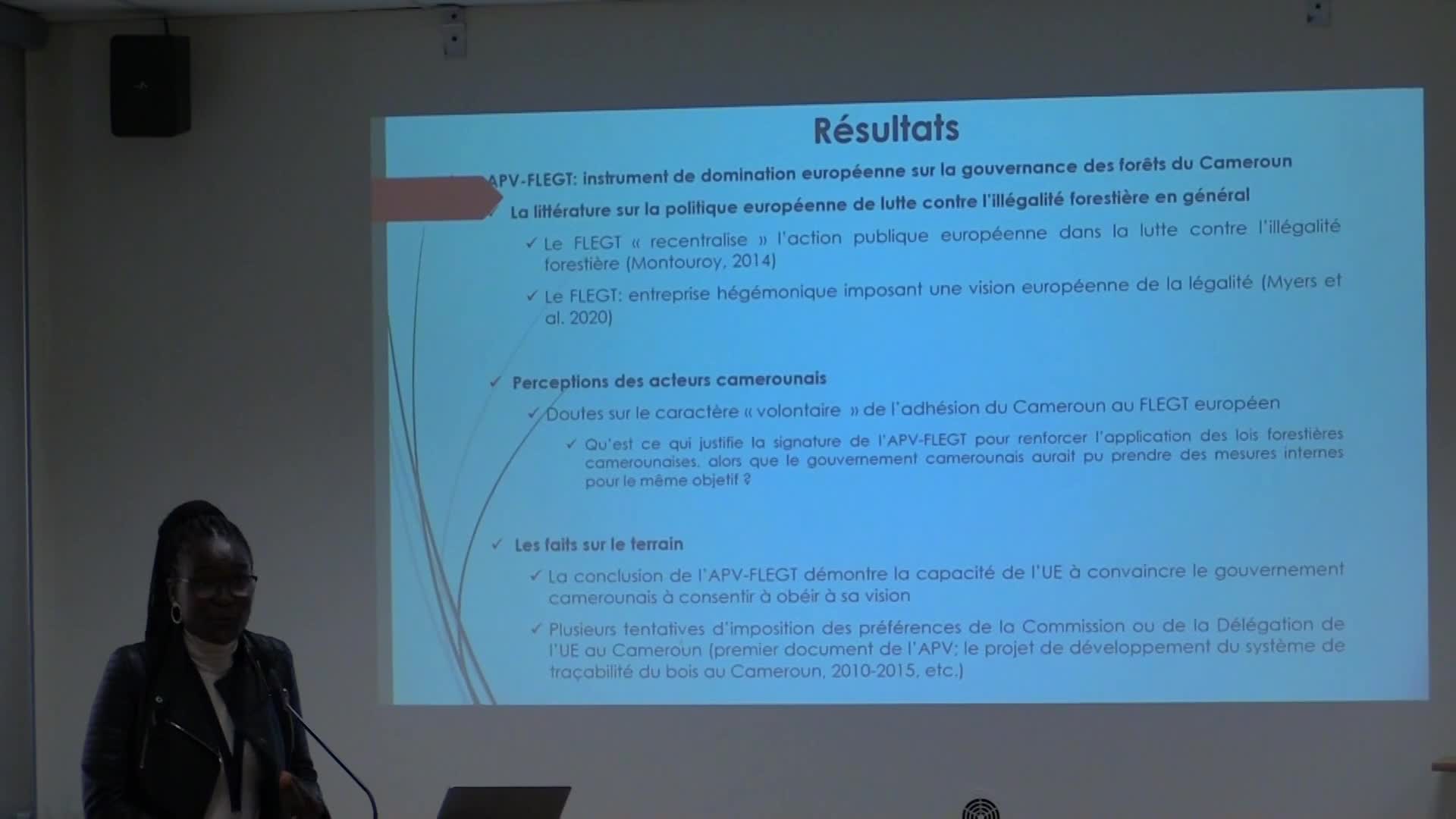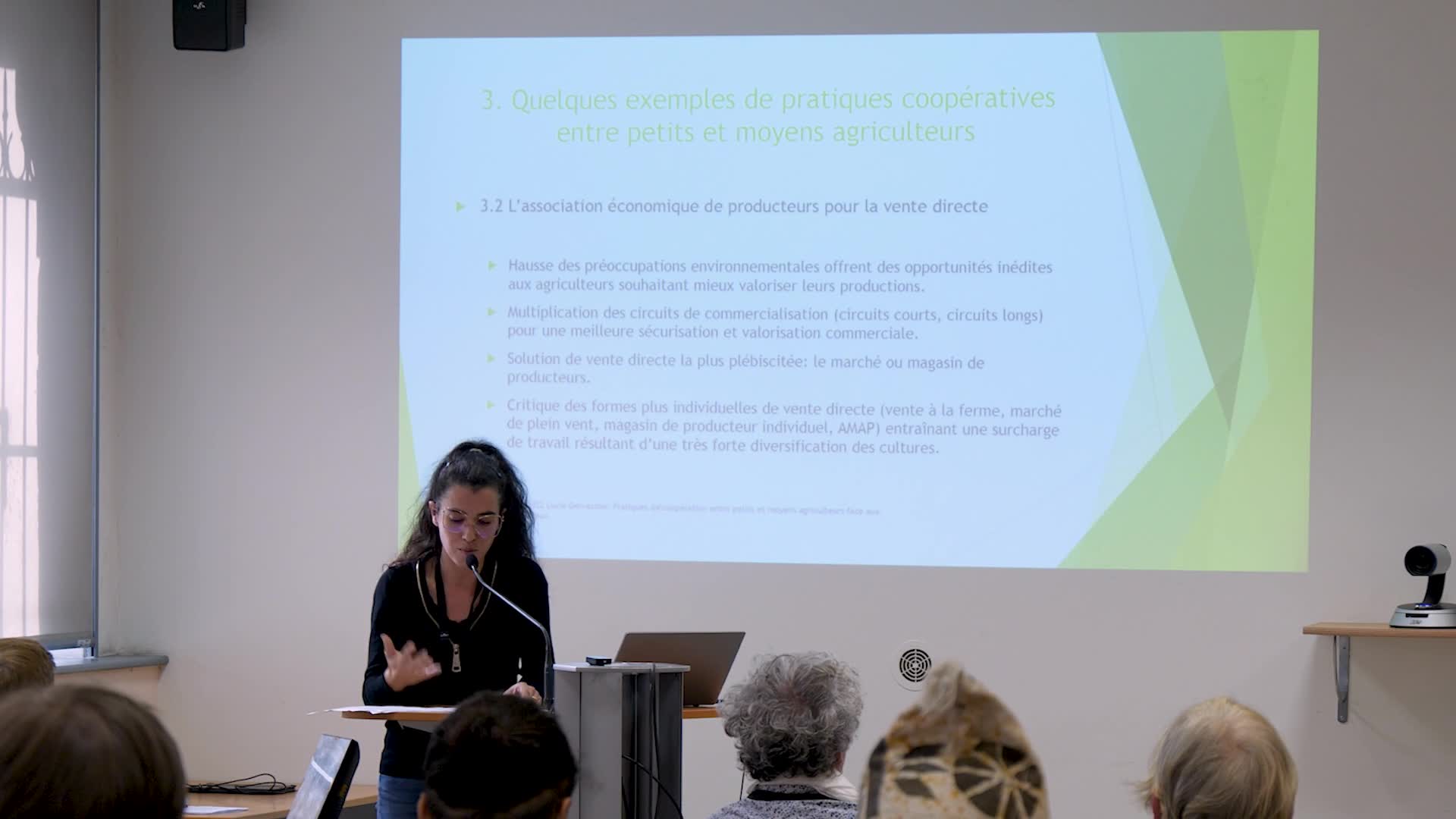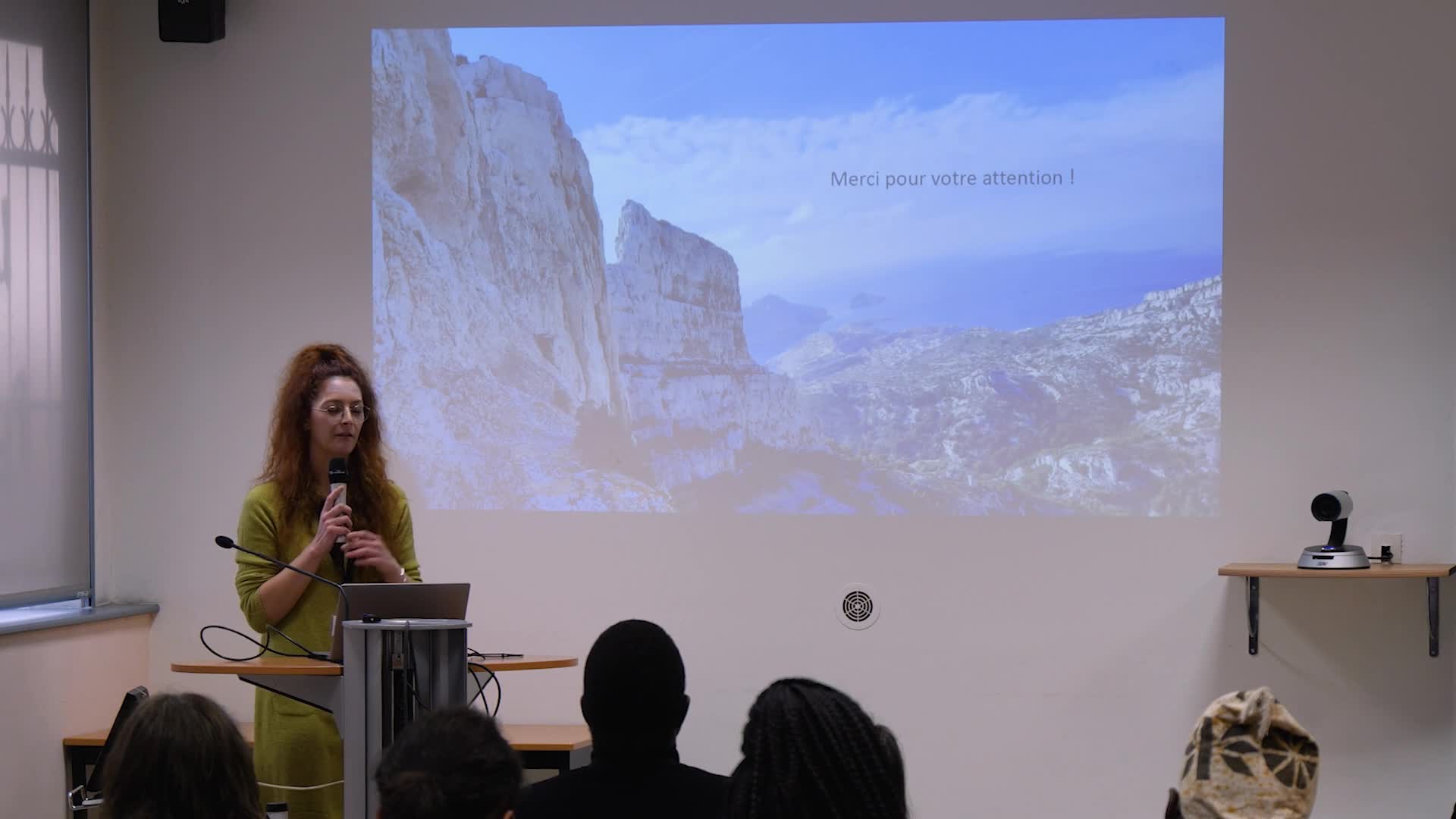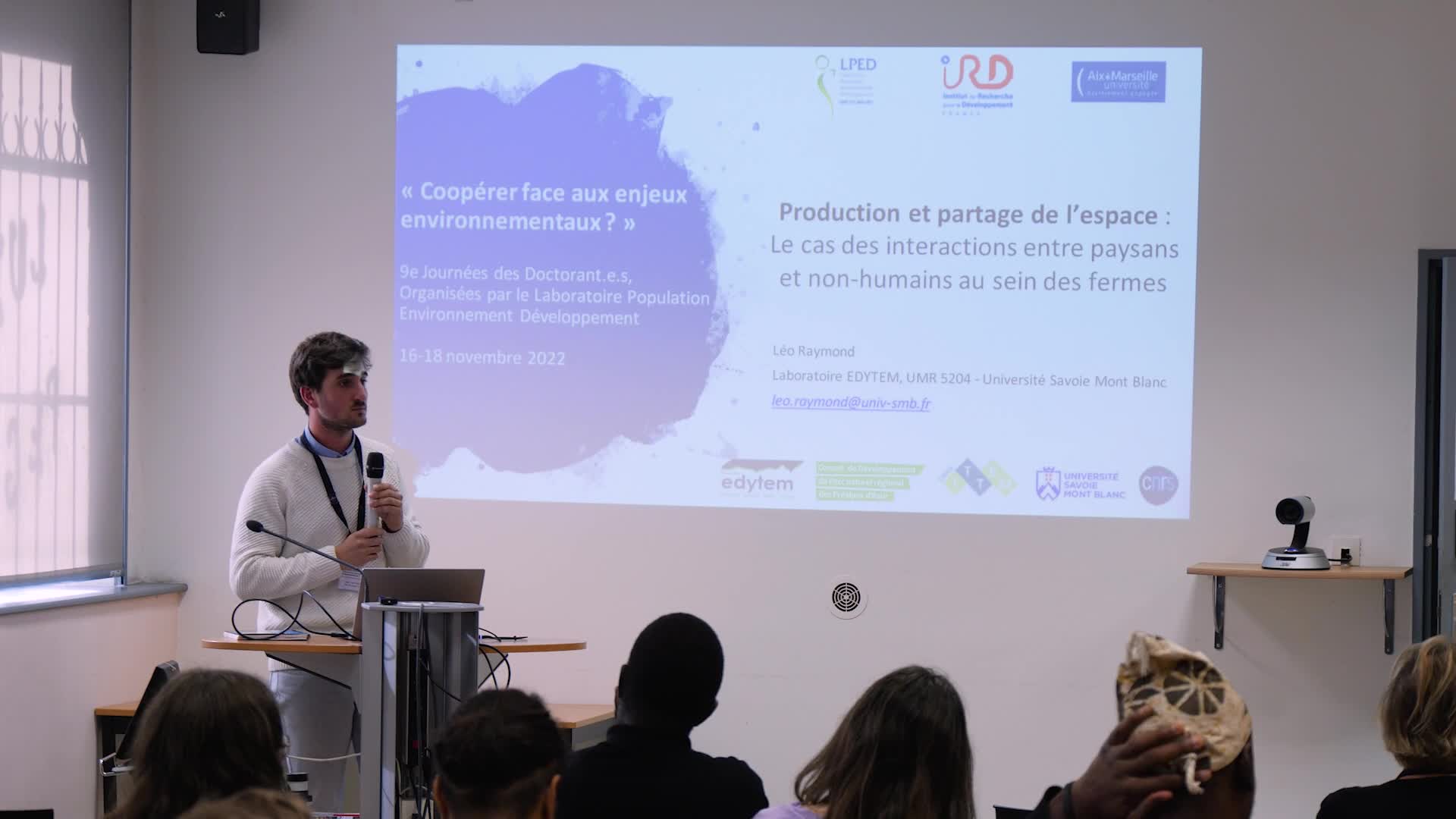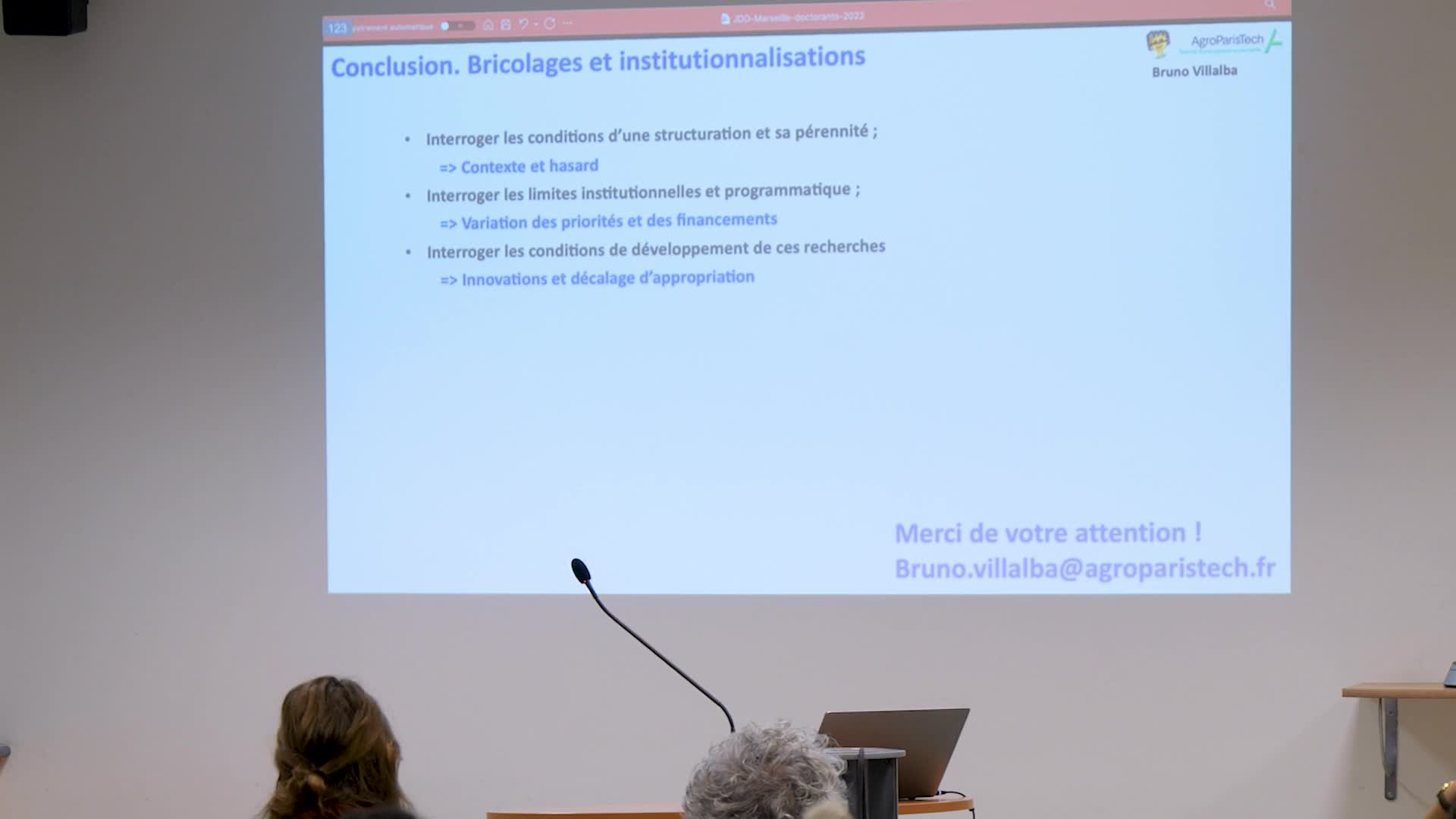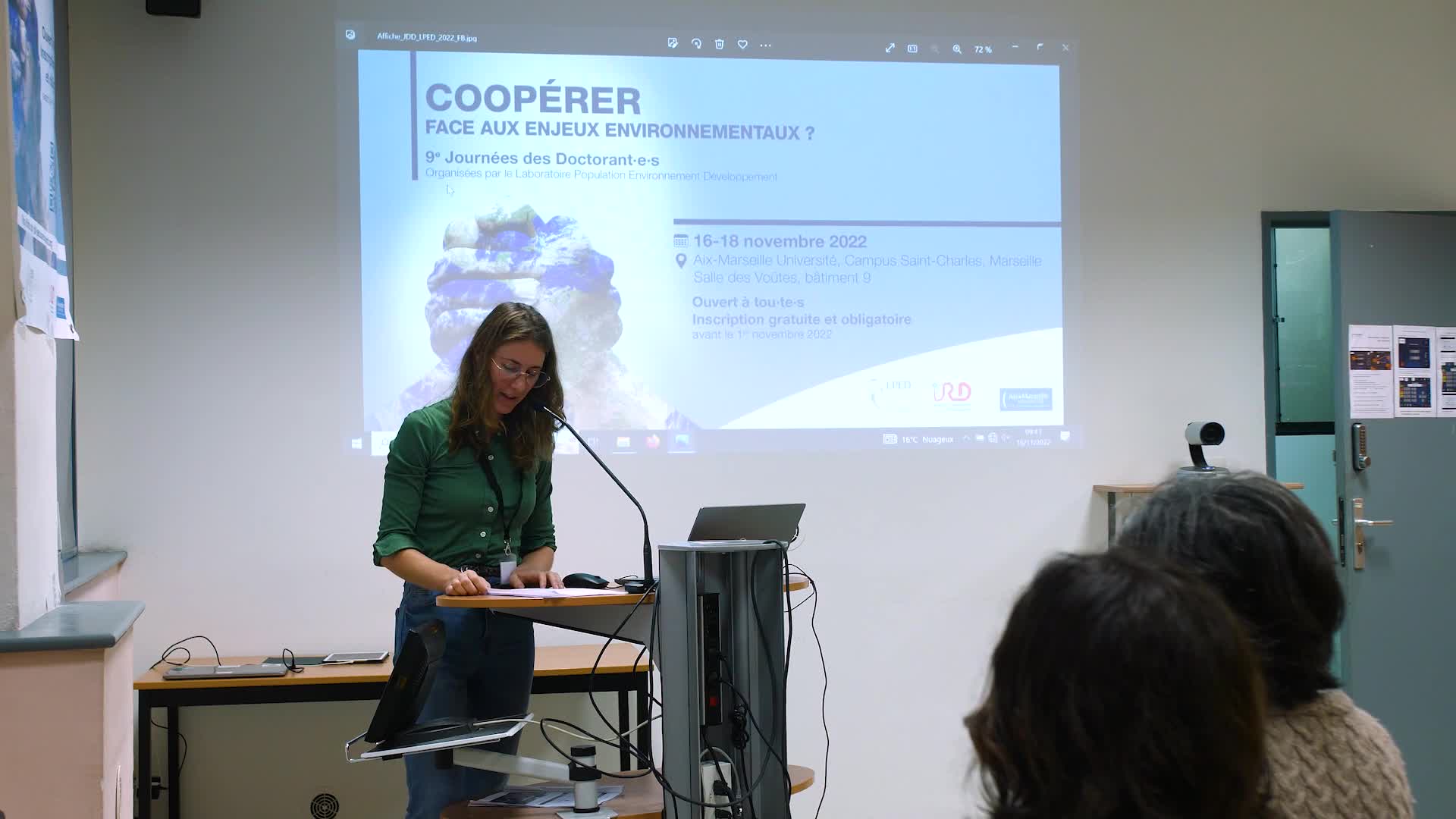Notice
Baka chronicle, April 2015, Messok district, Cameroon : a collect of wild honey
- document 1 document 2 document 3
- niveau 1 niveau 2 niveau 3
Descriptif
Camera, sound, editing: Romain Duda
Film editingassistance : Alain Epelboin (CNRS-MNHN)
Messok district, East Cameroon, april 2015
The honey harvestingis one of the highly valued activities for the Baka of southeastern Cameroon.Among a dozen of variety of wild honey, the one called pòki, produced bythe bee tòngyà (Apis mellifera) is particularly appreciated butimplies reaching a nest located, most of the time, several meters high in thetree.
This film details thetechniques employed in a domain of ecological knowledge locally developed bythe Baka. The swarm is located and identified thanks to the humming specific toeach species (Apis mellifera,stingless bees meliponines). At the foot of the tree, embers are first producedto feed a bee smoker (yànji) made out of a bundle of sticks stuffed intoleaves. A single-use basket (pèndi) is designed to lower the honey combsto the ground. The climber makes a climbing belt (yèndà) with a solidliana allowing him to lean against the trunk while he cuts footholes with hisaxe (kopa) as he ascends. On the ground, women and children discussabout the events of the previous day.
That day, despite thepropitiatory remedies, harvesting is poorer than expected. The bees were busyaround a swarm unreachable to the climber, the honeycombs have fallen inside atree hallow. He goes down with just enough honey to satisfy the children. Theremainder is wrapped with leaves and brought to the village, as the symbolicshare destined for elders.
Intervention / Responsable scientifique
Thème
Documentation
Liens
La place de la pêche dans les sociétés forestières a souvent été occultée derrière le terme de « chasseurs-cueilleurs ». Alors qu'il est d'usage de reconnaître la chasse comme une activité majeure
Dans la même collection
-
Un sabato di ramadan alla Moschea nera di San Paolo (Brasile)
JacquemotArmelleFondata nel 1974 da un gruppo di giovani afro-brasiliani ispirati ai Black Muslims, la Moschea nera di San Paolo ospita la più grande comunità di musulmani africani della Grande San Paolo - originari,
-
Pragas : assainissement à Recife, Etat du Pernambuco, Brésil
JacquemotArmelleÀ Recife, dans le Nordeste du Brésil, le manque d'eau courante et d'assainissement profite aux rats, cafards, scorpions et moustiques tigre qui sévissent dans toute la ville. Avec ses collègues du
-
Pragas : pest extermination in Recife, State of Pernambouco, Brazil.
JacquemotArmelleIn Recife (Brazil), the non-existence of sanitation and the lack of tap water make it easy for rats, scorpions and tiger mosquitos to spread, and they run rampant throughout the whole city. With his
-
Urgences (Marília, Etat de São Paulo, Brésil)
JacquemotArmelleUrgences présente la réalité du travail quotidien accompli par les chauffeurs-secouristes et les opérateurs de la Centrale d’ambulances de la ville de Marília (Etat de São Paulo/ Brésil),
-
Nice, bonne au Brésil
JacquemotArmelleNice est bonne à demeure dans une grande maison où elle vit confinée. Comme beaucoup de jeunes rurales de sa condition au Brésil, elle a quitté son village pour s'employer en ville chez des patrons
-
Un dossier lourd
Oumar et Baba, deux jeunes de 20 ans venus du Mali, se retrouvent dans le studio d’Oumar à Paris. Ils ne se sont pas vus depuis un an. Ils se racontent leurs problèmes administratifs, leurs amours et
-
Chroniques baka, district de Messok, Est Cameroun, mars 2013 : les pièges à souris
DudaRomainL'acquisition des techniques et des connaissances de chasse chez les Baka commence dès l'enfance.
-
Guérir des visions nocturnes : pratique de soin par un devin-guérisseur aka du village d'Enyelle, …
DudaRomainArmand, 14 ans, souffre de visions nocturnes depuis plusieurs années. Ses rêves sont régulièrement visités par des Mami Wata, sirènes ou génies des eaux symboles de sexualité et de féminité. Ces
-
Chronique des Pygmées baka : Fabrication du Lingbidi, l'arc à deux cordes. Baka Pygmies : Making …
MagetLaurentPygmées Baka : Fabrication du Lingbidi, arc à deux cordes : Tournage au campement d'Awolowolo " 3° 6'31.94"N 13°53'4.37"E "Exclusivement féminin tant dans sa fabrication que dans son utilisation
-
Sommeil d'enfant et chant des femmes chez les Aka
DudaRomainVillage de Lilongo, département de la Likouala, Congo, 13 mars 2018 Au Congo, dans un village aka, un nouveau-né dort à poings fermés lors d’un chant polyphonique entonné par les femmes. D’autres
-
Chronique aka, décembre 1993 Zomia, Lobaye RCA : réveils et petits déjeuners des enfants à côté d’u…
EpelboinAlainLes résidents d'Akungu se sont installés pour un temps à Zomia, sur un terrain de surface limitée dépendant de la mission catholique. Le cercle des cases est très reserré et les gens sont beaucoup
-
Regarder grandir Elsa, de septembre 1988 à avril 1991 en 145 mn
TaiebJean-MarcDe la naissance d'Elsa à celle de sa soeur Héléne, le spectateur suit minutieusement le développement du bébé et les interactions avec sa mère, alors secrétaire médicale, sa soeur aînée adolescente et
Avec les mêmes intervenants et intervenantes
-
Chroniques baka, district de Messok, Est Cameroun, mars 2013 : les pièges à souris
DudaRomainL'acquisition des techniques et des connaissances de chasse chez les Baka commence dès l'enfance.
-
Guérir des visions nocturnes : pratique de soin par un devin-guérisseur aka du village d'Enyelle, …
DudaRomainArmand, 14 ans, souffre de visions nocturnes depuis plusieurs années. Ses rêves sont régulièrement visités par des Mami Wata, sirènes ou génies des eaux symboles de sexualité et de féminité. Ces
-
Sommeil d'enfant et chant des femmes chez les Aka
DudaRomainVillage de Lilongo, département de la Likouala, Congo, 13 mars 2018 Au Congo, dans un village aka, un nouveau-né dort à poings fermés lors d’un chant polyphonique entonné par les femmes. D’autres
-
Smoking out the porcupine. A hunting party between brothers. Chronicle Baka, District of Messok, Ea…
DudaRomainCamera, sound, editing : Romain Duda Hunting strategies among the Baka are multiple, their choice is based on different incentives and preferences : daily and seasonal needs, mobility, human and
-
Forest camp cooking : a meal of porcupine. Baka chronicles. Messok district, East Cameroon, June 20…
DudaRomainCamera, sound, editing : Romain Duda The brush-tailed porcupine (Atherurus africanus) is one of the most appreciated and hunted game species in Central Africa. Abundant near the villages, this
-
Chronique Baka, arrdt de Messok, avril 2015 : une collecte de miel sauvage
DudaRomainCaméra, son, montage : Romain Duda Aide au montage : Alain Epelboin (CNRS-MNHN) La récolte du miel sauvage fait partie des activités fortement valorisées chez les Baka du sud-est Cameroun.
-
Baka chronicle, June 2013, Lomié district, Cameroon : Hook fishing with Moussolo
DudaRomainCaméra, son, montage : Romain Duda (ICTA, Universitat Autonoma de Barcelona / UMR7206 Musée de l’Homme, MNHN) The video shows the different stages of a hook fishing practiced by Moussolo, a Baka man
Sur le même thème
-
La place de l'édition scientifique publique dans le panorama de l'écologie du livre
GokselNisanCe webinaire est la première action du groupe de travail "Écologie du livre" piloté par Nina Koulikoff (MSH Mondes) et Cédric Vigneault (Enssib)...
-
Villes et environnement en Jordanie et à Oman
AbabsaMyriamKlingerThibautBilardelloSophieConférence publique de l’Institut d’études de l’Islam et des sociétés du monde musulman (IISMM) en partenariat avec la Bibliothèque universitaire des langues et civilisations (BULAC).
-
Présence et transferts des PFAS dans les écosystèmes aquatiques
LabadiePierreLes composés per- et poly-fluoroalkylés (PFAS) sont au cœur de l'actualité. Ces « polluants éternels » constituent une pollution inédite des écosystèmes qui touche tous les milieux. Cette présentation
-
La nuit est belle ! Respectons-la...
VauglinIsabelleInitiée par l'agglomération du Grand Genève, « La nuit est belle ! » est une action dont le but est de sensibiliser le grand public aux nuisances engendrées par la pollution lumineuse en demandant aux
-
L’éducation à l’environnement
CarlierNadègeLe GRAINE Normandie est le réseau des acteurs de l'Education à l'Environnement et au Développement Durable (EEDD) en Normandie.
-
Voyage au coeur des déchets électroniques
Les objets électroniques ont très largement transformé nos sociétés modernes. Ils ont permis le développement d’infrastructures toujours plus complexes et connectées, promesses d’une transition
-
Coopérations Nord / Sud
Communications - Firmin Kra, Sandrine Andong - Coopérations Nord / Sud
-
Pratiques de coopération entre petits et moyens agriculteurs : une lecture de classe des modalités …
Communication - Lucie Gervasone - Pratiques de coopération entre petits et moyens agriculteurs : une lecture de classe des modalités adaptatives aux enjeux environnementaux en agriculture
-
Les interactions plantes-microorganismes du sol dans le cadre de la restauration écologique des éco…
Communication - Lorène Tosini - Les interactions plantes-microorganismes du sol dans le cadre de la restauration écologique des écosystèmes contaminés en métaux
-
Production et partage de l’espace : le cas des interactions entre paysans et non-humains au sein de…
Communication - Léo Raymond - Production et partage de l’espace : le cas des interactions entre paysans et non-humains au sein des fermes
-
Coopérer dans les champs de la recherche : entre opportunité et autonomie
VillalbaBrunoConférence introductive - Bruno Villalba - Coopérer dans les champs de la recherche : entre opportunité et autonomie
-
Introduction - Coopérer face aux enjeux environnementaux ?
Mot d'introduction - Anne-Gaëlle Beurier, Lucie Gervasone, Lorène Tosini - Coopérer face aux enjeux environnementaux ?



